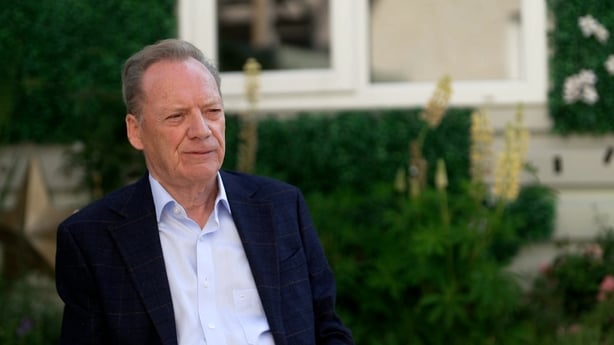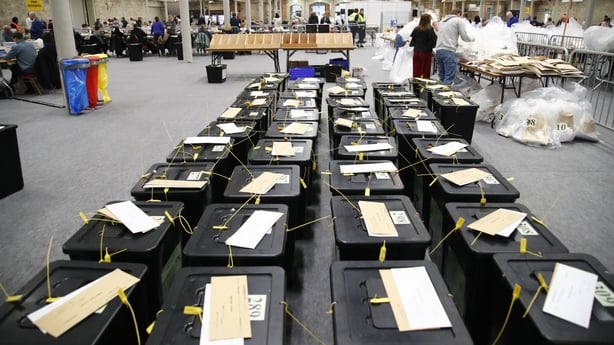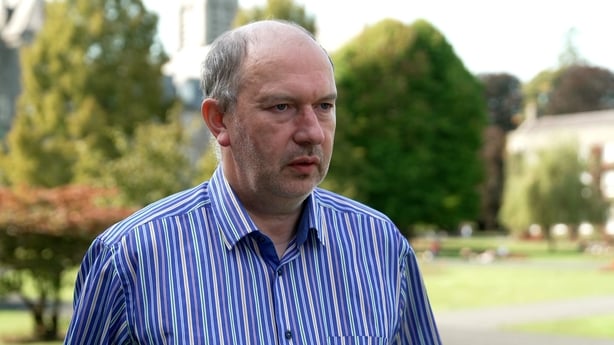Whether it's called for November or early next year, the next general election is only a matter of months away.
Despite the interest in when the election will take place, some analysts are concerned about whether or not people will turn out to vote.
The turnout for the local elections in June was just 49.4%.
"That’s the lowest ever turnout level we had for local elections in the history of the state," Dr Adrian Kavanagh from Maynooth University, who focuses on the geography of elections, told Prime Time.
"It's the first time over half the registered electorate didn't turn out to vote in city and county council elections."
But there may be a reason behind why our voting figures are so low.
Psephologist Odran Flynn, who first started analysing Ireland’s electoral register two decades ago, believes an inaccurate electoral register is a leading factor in Ireland’s low election turnout figures.
Mr Flynn told Prime Time that there could be hundreds of thousands more names on the electoral register than there should be due to duplication.
"Turnout is obviously calculated as a percentage of the number of people who voted on who are on the electoral register…However, that assumes that the register is right, whereas I believe it's still way, way out."
"The local government elections were only in last June and the turnout was 49%. However, the register is in fact way overstated. There are still far too many people on it."

Donegal
Using the most recent Census data from 2022, Mr Flynn analysed electoral data for Donegal to highlight the problems with the electoral register.
"There's 167,000 people in the county of Donegal, of all ages. There's just 128,000 who are over 18, who are eligible to vote, yet 142,000 were on the register for Donegal."
He said that assumes that 128,000 people are registered to vote but they are not.
Mr Flynn said the average registration rate across western Europe is between 80-90 %, with Ireland at around 85%.
"Effectively it means there are only around 110,000 people who realistically should be on the register [in Donegal] and that's over 30,000 more on the register than should on it," he said.
"All of the seven LEAs in Donegal had a turnover of 53.9 %. However, if you actually take a realistic register for Donegal, it figures up near 69 %," Mr Flynn said.
International figures
Compared with other parliamentary democracies, Ireland’s voter turnout ranks at the lower end of the scale, according to data from the International Institute for Democracy and Electoral Assistance (IDEA).
Belgium, where voting is compulsory, has a turnout level above 87%. Sweden has 84% and the Netherlands has 78%. Whereas in Ireland, the turnout for the 2020 general election was 62.9% - down from 65% in 2016.
"Admittedly, our turnout rate in the last general election was slightly higher than the turnout rate for the very recent UK general election [59.7%], but who knows what our turnout rate will be in a few months time. We're definitely down towards the lower end of the scale," Dr Kavanagh said.
"There's a good chance we may have the lowest ever turnout level in the upcoming general election. We might even have the first ever general election turnout that falls below 60% in the history of the state," he added.
Dr Kavanagh says the "messiness" of the electoral register is likely causing turnout figures being completely inaccurate in a lot of areas across the country.

Issues with the register
An Coimisiún Toghcháin, Ireland’s electoral commission, is the statutory, independent body, established in February last year tasked with modernising the electoral register.
"In a couple of years’ time, I am hopeful our electoral register will be bulletproof or at least much better than it is," Art O’Leary, Chief Executive of An Coimisiún Toghcháin told an Oireachtas Committee in February.
"We are encouraging people – no more than that – to include PPS numbers, dates of birth and Eircodes because there is a project under way in the Department of Housing and with the local authorities to create a single database," Mr O’Leary said.
Mr O’Leary further explained the issues with the electoral reasons in its current form.
"People think there is one big register. We have 28 separate registers in this country and they do not talk to each other," he said.
"We are good at putting people on the register but sometimes not so great at taking people off. If you live as an 18-year-old at home in Kerry, go to college in Dublin, do your master’s in Limerick and then get a job in Waterford, it is likely you will appear on four or five different electoral registers."
Mr Flynn acknowledged that An Coimisiún Toghcháin has been very proactive in encouraging people to register to vote but there are still a lot of people on the register who should not be on it – as they are deceased, have emigrated or are duplicated on the register in different areas.
"Looking at the figures, I'd say there are still several hundred thousand more on the register than there should be."
Mr Flynn said people who are moving or emigrating often don’t think to take their names off the register.
Mr Flynn told Prime Time that in county Donegal alone, there are 14,000 more people on the register than there should be when you crunch the numbers.
"Their priority isn't going to be to make sure that their name is taken off the register. They don’t do it. That's just being realistic."

The importance of high and diverse numbers of people turning out to vote should not be underestimated, according to Dr Adrian Kavanagh.
"If you tend to find there's a higher percentage of turnout for middle-class areas relative to working-class areas, you're going to expect to see a very notable bias in terms of who gets elected."
Ultimately, turning out to vote is crucial for a healthy democracy, Dr Kavanagh says.
"Turnout matters because, first of all, it says a lot about the strength of democracy. If, for instance, you had a turnout rate of 10%, then the sense of the sense of legitimacy that the government has, or indeed the state has, is very much eroded in those circumstances."
Although low voter turnout is a feature cross the democratic world, in Ireland we are still somewhat in the dark because our topline turnout figures are so low and the electoral register is in such a poor state.
An Coimisiún Toghcháin have pledged the register will be "bulletproof" in a few years. This means problems will remain for the next general election, at least.






